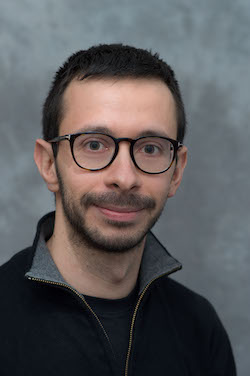Biography
Dr. Denis Lacabanne is a biochemist who graduated with a Bachelor's degree in 2012 and a Master's degree in Structural and Functional Biochemistry in 2014 from the University of Lyon (Claude Bernard) in France. He specializes in studying membrane proteins using solid-state Nuclear Magnetic Resonance (NMR) and has contributed to the characterization of transporters involved in antibiotic resistance and a protein complex linked to stomach cancers.
During his PhD under the supervision of Dr. Anja Böckmann, he conducted a structural study of an ATP Binding Cassette transporter using solid-state NMR and received the bioMérieux Prize.
Afterward, he joined the group of Prof. Beat Meier and he worked as a post-doc on ABC transporters at ETH Zürich before moving to the University of Cambridge as a second post-doc in the group of Prof. Edmund Kunji to expand his expertise in structural biology using cryogenic electron microscopy. In the Mitochondrial Biology Unit, he is working on two mitochondrial transporters (the aspartate/glutamate transporter and the ATP/Phosphate transporter) for which he is trying to understand the mechanism and to develop inhibitors for their structure determination.
Research Interests
Dr. Denis Lacabanne has dedicated his research to the mechanistic and structural studies of membrane proteins. These proteins are challenging to both express and characterize, particularly in bacterial systems. Despite these difficulties, they are critical to study as they serve as the bridge between the extra-cellular and intra-cellular environments.
During his doctoral studies and first post-doctoral position at ETH Zürich, Dr. Denis Lacabanne focused on ABC transporters, the mechanism of which was not well understood at the time. He employed solid-state NMR to examine the proteins at an atomic scale within their lipid environment. Using 13C and 31P solid-state NMR, Dr. Denis Lacabanne and his collaborators were able to shed light on the mechanism of action of some of these ABC transporters through ATP hydrolysis studies.
In his second post-doctoral position at the University of Cambridge, Dr. Denis Lacabanne changed his approach and shifted his focus to Cryogenic electron microscopy. He joined the group led by Professor Edmund Kunji and is currently studying two calcium-regulated mitochondrial carriers of the SLC25 family: the aspartate/glutamate carrier and the ATP/Phosphate carrier. The goal is to understand the mechanisms behind substrate exchange and the regulation of calcium.
Additionally, as part of his structural studies on the aspartate/glutamate transporter, Dr. Denis Lacabanne is also collaborating with Dr. Sotiria Tavoulari. The aspartate/glutamate transporter, also known as Citrin, is involved in a common genetic disease prevalent in East Asia and South-East Asia: Citrin Deficiency. Dr. Sotiria Tavoulari and Dr. Lacabanne are investigating the effects of different mutations on Citrin and the resulting mechanical consequences. These works are Funded by the Citrin Foundation, a research-driven, not-for-profit organization set up to tackle Citrin Deficiency.
Selected Publications
Lacabanne, D., Wiegand, T., Di Cesare, M., Orelle, C., Ernst, M., Jault, J. M., Meier, B.H. & Böckmann, A (2022)
Solid-state NMR reveals asymmetric ATP hydrolysis in the multidrug ABC transporter BmrA.
Journal of the American Chemical Society 144, 27, 12431-12442.
Tavoulari, S., Lacabanne, D., Thangaratnarajah, C., & Kunji, E. R. (2022).
Pathogenic variants of the mitochondrial aspartate/glutamate carrier causing citrin deficiency.
Trends in Endocrinology & Metabolism 33, 8, 539-553.


